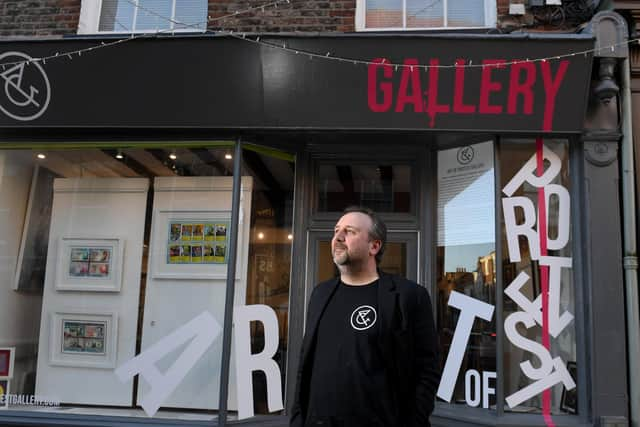Yorkshire's retailers on how they've stood up to the challenge of the Covid pandemic


Staring down from the walls of The Art of Protest gallery are striking images of three of the main protagonists in the Government’s response to the coronavirus pandemic.
The canvas prints of Boris Johnson, Matt Hancock and Michael Gove have a grotesque quality to them, their facial features distorted as they clap their seemingly bloodied hands in a reference to the weekly tributes staged across the nation to the NHS and key workers earlier this year.
Advertisement
Hide AdAdvertisement
Hide AdFor the owner of the gallery in York, Craig Humble, it is simply a relief that he is able to continue to be showcasing works from some of the world’s leading modern artists, including the portraits of the Government’s Ministers by WeFail.


Mr Humble launched the venture, which offers art for sale from between £50 and £6,000 and is currently featuring the works of 16 artists, in February 2007 when he opened a gallery tucked away in the cobbled streets of Back Swinegate in the heart of York.
But when negotiations with his landlord, York Council, to renew the lease faltered, Mr Humble was forced to find a new location for his business during the midst of the global pandemic.
He is now based in Walmgate on the fringes of the city centre, renting a ground-floor unit from a property firm called Mulberry, which is based upstairs, in a move than has saved him £23,000 a year.
Advertisement
Hide AdAdvertisement
Hide AdThe 49-year-old father-of-two, who lives with his wife, Samantha Barker, an English teacher, in Pocklington, said: “It has been a tough year, and the pandemic has had such a huge impact for everyone. It is impossible to plan ahead, which has made it so hard.
"I used to plan an art exhibition six months in advance, but that just can’t happen now. You simply don’t know what is going to happen from one week to the next.”
York was the worst affected location in the country for shop closures in the first half of this year as the coronavirus crisis has left the nation’s retail sector in tatters.
Statistics published in October by the Local Data Company and the accountancy firm PwC showed that a total of 11,120 chain store outlets closed between January and June, while 5,119 shops opened.
Advertisement
Hide AdAdvertisement
Hide AdThe 6,001 net store closures was a record high and compared with 3,509 stores shutting in the first half of last year. York was the worst affected, with 55 net shop closures in the first six months of the year, followed by Newcastle upon Tyne with 43 closures and Worcester witnessing 26 stores shutting their doors.
York Council’s executive member for the economy, Coun Andrew Waller, said the statistics only took into account chains, and stressed the city’s independent stores had sunnier prospects with support rocketing during the lockdowns.
Working with the city’s Business Improvement District group, Coun Waller said the council had been able to much more accurately track footfall since restrictions were lifted.
“When everything opened up, the footfall was relatively strong and the spend some days was at 97 per cent of what it was,” he said. “So the people who were coming were determined to spend.”
Advertisement
Hide AdAdvertisement
Hide AdThe council received £110m of government funding to help local businesses, as well as assisting many ventures, such as The Little Apple Bookshop, to set up online so customers could take advantage of click and collect services.
A separate study published last month showed that small independent enterprises have adapted more successfully than chain stores. Small independent firms on the High Street suffered a net decline of 1,833 stores in the first half of 2020, according to research again by the Local Data Company and PwC. That was less than a third of the 6,001 chain stores lost, the figures revealed.
Among the independent businesses which has survived the pandemic is the Imagined Things bookstore in Harrogate.
Its owner, Georgia Eckert, had already faced a tough task in ensuring the enterprise was profitable - in June 2018 she appealed for more customers via Twitter, stating she had only taken £12.34 in a single day.
Advertisement
Hide AdAdvertisement
Hide AdMrs Eckert opened the store, which lays claim to being the first independent bookshop in Harrogate for 20 years, in July 2017 and lives with her husband, Karl, in Harrogate. She has had to rely on the Government’s furlough scheme for her four part-time staff members, but she is hopeful for the future.
She said: “Independent bookshops are in a battle against the major online retailers, but it is a specialist sector and has had to be inventive in the past.
“In many ways, the lockdown has encouraged people to rediscover a love of reading, as they have been at home so much. I am not saying bookshops are bulletproof from the effects of coronavirus, and there will be some losses. But I am hopeful that for those that survive, there will be a new interest in them.”
Just off the main shopping street of Briggate in Leeds, lies one of the city’s well-established fashion stores. Accent Clothing in Queen’s Arcade has been a constant in Leeds’ retail sector for the past 36 years, since Martin Schneider founded the business in 1984.
Advertisement
Hide AdAdvertisement
Hide AdHis son, Jack Schneider, the general manager, has helped oversee major changes in the business which has witnessed a rapid growth online during the pandemic. In the first lockdown from March until the store was able to re-open in June, online sales grew by 350 per cent.
The majority of the company’s 30 staff have remained furloughed, but there are hopes of a pre-Christmas trade boost.
Mr Schneider, whose sister, Becky, also works at the business as its e-commerce manager, said: “It has been tough, as we have faced so much uncertainty, not knowing when and if we will be able to actually open the store - we order stock eight to 10 months in advance, and that has obviously been a real challenge during the pandemic.
"Online sales are totally different in many ways, as they are so price-sensitive and we have seen profit margins squeezed.
Advertisement
Hide AdAdvertisement
Hide Ad“It has been a bumpy road throughout this year, but I am optimistic - there is no doubt about it, we have a more efficient business. The High Street is facing so many challenges, but businesses that are going to survive have to adapt.”
Comment Guidelines
National World encourages reader discussion on our stories. User feedback, insights and back-and-forth exchanges add a rich layer of context to reporting. Please review our Community Guidelines before commenting.